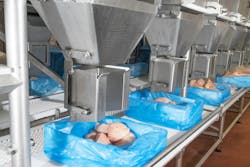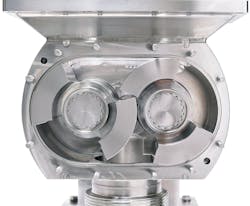Case study: Poultry processor tackles challenging forming application with new pumps
Key Highlights
- Peco Foods has a rich history dating back to 1937, evolving into a major poultry producer with a focus on food safety and quality.
- The company faced processing challenges with frozen chicken and foreign material intrusion, impacting efficiency and product safety.
- UHT's QuickStrip FoodFirst pump eliminated rotor bolts, reducing damage, foreign material risks and maintenance issues, leading to increased uptime.
- Implementation of the new pump resulted in an estimated annual savings of $250,000 and improved product quality due to consistent temperatures and reduced downtime.
- Peco plans to expand the use of UHT pumps across multiple facilities, emphasizing their commitment to innovative, safe and efficient poultry processing.
From its early beginnings as a family-owned, small hatchery and feed mill in Gordo, Alabama, in 1937, Peco Foods has a rich history in the poultry processing industry. Through the decades, Peco has expanded its capabilities by adding growers (1940s), feed mills (1950s) and processing plants (1960s) to its business operations.
Today, Peco Foods, Inc. is still family-owned and has operated on the same principles embedded in its culture since its founding over 80 years ago. Headquartered in Tuscaloosa, Alabama, Peco is the eighth-largest poultry producer in the United States. The company serves the retail, fast food, food service, industrial and export markets from its 22 facilities across the Southeast U.S.
Food safety
Food safety is a top priority for Peco Foods and part of its overall vision to be a world-class food company. Peco strives to be the “brand within the customers’ brand” by driving food safety and quality to the customer every time. Food safety is part of the culture at Peco, not just a series of programs and protocols to follow.
Challenge
At its world-class processing plant in Pocahontas, Arkansas, Peco makes chopped and formed products for the quick-service restaurant industry at a rate of 9,000 pounds per hour. The processing line is 90 feet long and relies on a hygienic pump to move the ground chicken through the line’s six-inch piping. The chicken is processed at 26°F - 28°F, making it very challenging to move the product while maintaining product integrity, safe pressurization and productivity requirements.
In addition to overseeing day-to-day operations, Alan Risley, plant manager at Peco’s Pocahontas plant, champions the company’s commitment to food safety and shares his knowledge of food processing with other Peco leaders. So, when Risley could not maintain enough speed to keep the line full with the pump in use on the line, he called upon Unibloc Hygienic Technologies (UHT) for a different approach.
The Unibloc lobe pump was able to keep up with the speed requirements at a lower RPM, preserving the protein lost with the previous pump. Even so, blocks of frozen chicken clogged the system, causing pressure spikes and damaging equipment. A four-inch metal detection system was also creating backpressure, causing further damage to the pump. Daily clean-in-place (CIP) routines sometimes resulted in the pump’s rotor bolts being over-torqued, while planned stops to inspect the pump and line for foreign material slowed production.
Anytime a potential foreign material was identified, the impacted product was condemned. To keep the pump operational — and the food safe — costs added up quickly.
Approach
During the course of several months, Peco and UHT implemented various improvements to the line. A new inlet flange helped get the product to and through the pump, despite its viscosity and frozen temperatures. Additionally, the metal detector was sized up to six inches, matching the piping size and eliminating the backpressure.
Still, issues with over-pressurization remained, causing deflection of the rotor bolts, making them susceptible to breakage. Improper torquing of the rotor bolts after daily CIP only added to the issue. And foreign material intrusion was still a threat.
Fortunately, Risley was open to testing UHT’s QuickStrip FoodFirst 600 series pump. The design and construction of this pump addressed every challenge Peco was facing on its chicken nugget processing line. The QuickStrip FoodFirst pump design eliminates rotor bolts, adding durability in the harshest applications. Simple, repeatable, one-way assembly guarantees proper performance and reduces damage from improper handling. The all stainless-steel design with no plastics and no o-rings improves detectability and minimizes foreign material risk.
“UHT was dedicated to the improvement of the line and stayed very engaged through the entire process,” said Risley. “They offered good support, were open to issues and chased items to resolution.”
Results
The QuickStrip FoodFirst pump increased uptime and reduced potential foreign material issues in an application that no other pump could handle. Product quality has improved through reduced pressures that eliminate overworking and consistent temperatures due to the absence of unplanned downtime. Risley estimates a savings of $250,000 annually with the increase in productivity and no product loss. Peco is also enjoying a longer pump life than expected.
“UHT offers great customer support, and the pump is well-built and addresses our needs,” said Risley. When asked what feedback he hears from his operations team about the UHT solution, Risley stated, “Nothing, which is good because it means the pump is running well.”
UHT units are also in use at Peco’s West Point, Mississippi, plant. The QuickStrip FoodFirst pump is slated to be installed at Peco’s mechanically-separated chicken (MSC) facility, and the company plans to default to the FoodFirst pump as the primary choice for future projects.
About the Author
Calle Danielsson
Engineer with Unibloc Hygienic Technologies
Calle Danielsson is a sales engineer with Unibloc Hygienic Technologies, a manufacturer focused on sanitary pumps for food and beverage, pharmaceutical, bakery and confection, meat and poultry, brewery and transportation environments. He specializes in helping customers select the ideal pump for an application.

